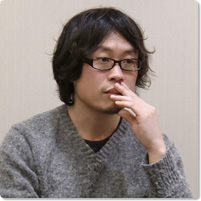Data
:
First Performance: 2004
Performance time: Approx 1 hour, 20 min.
Acts / Scenes: 2 acts, 10 scenes
Cast: 7 (5 men, 2 women)
Toshiki Okada
Sangatsu no Itsukakan (Five Days in March)

Toshiki Okada
Born in Yokohama in 1973, lives in Kumamoto prefecture. Okada is a playwright and novelist. As founder of the theatrical company chelfitsch, he is the writer and director of the company’s productions. In 2005, he won the 49th Kishida Kunio Drama Award for Five days in March. Since then, he became the focus of attention for his activities both at home and abroad. In 2008, His novel The End of the Special Time We Were Allowed received the 2nd Ōe Kenzaburō Prize. From 2016, he directed repertory works of the Munich Kammerspiele theater company for four seasons. In 2020, his work The Vacuum Cleaner was selected as one of the “ten remarkable productions” by (Berliner) Theatertreffen. In 2020, Okada’s stage adaptation of the Thai novelist Uthis Haemamool’s original novel, titled Pratthana – A Portrait of Possession won the 27th Yomiuri Theater Awards, Selection Committee Special Prize. In 2021, he attempted directing an opera for the first time with Yuzuru. In these ways, Okada continues to expand his range of activities.
chelfitsch
https://chelfitsch.net/en/

One of couples had just met at a live performance club in Roppongi and ended going straight from there to a love hotel in Shibuya, where they spent five days. Going out to eat from time to time, the couple Minobe and Yukki suddenly find that they are seeing Shibuya with fresh new eyes. Then there is Minobe’s friend, the slightly wired girl Miffy and the boy Azuma who she meets at a movie theater. There are also the two young men Yasui and Ishihara who are taking part, somewhat half-heartedly, in an antiwar march in Shibuya.
The play’s style is one in which the seven actors come on stage as “Actor 1” and “Actor 2” and proceed to take turns telling the audience the stories of the characters of the play as if they had just heard the stories from the characters themselves. For example, here is what one of the actors says: “OK. I guess I’ll begin telling the story of
Five Days in March
starting with day one. First of all, I think we’ll say this is set in March of last year and it’s the story of this guy named Minobe who wakes up one morning and realizes he’s in a love hotel and he’s like ‘Hey, I’m in a love hotel’ and, not only that, there’s this girl who’s like asleep beside him and he’s saying ‘I don’t know this chick’.” In this way, the actors don’t play the roles of the characters but simply relate their actions to the audience.
This work, which has no real plot or notable incidents occurring, is an attempt at a serious exploration of “present expression.” First of all it removes the deceptive theatrical element of how skillfully actors can “act out a role,” and then it tries to eliminate the artificiality that always exists to some degree in lines spoken by the actors when they are clearly from a drama-like script.
As a work born at the end of a quest for the most sincere form of expression in the present,
Five Days in March
skillfully juxtaposes the grand-scale event of “War” and what can be called the almost insignificance of real daily life, to succeed beautifully in giving form to the ungraspable sense of the present held by Japanese young people.
Related Tags

